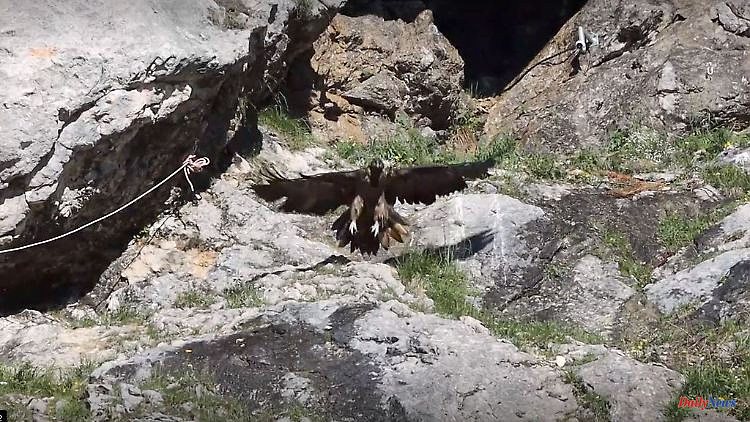Last June they couldn't even fly and had to be fed. Now the bearded vultures Dagmar and Recka, which were released near Berchtesgaden, are doing well in the wintry mountains. Avalanches are very important to them.
Ramsau (dpa / lby) - They are not yet a year old - but the two young bearded vultures Dagmar and Recka have mastered their first winter in the mountains well so far. The animals released into the wild in the Berchtesgaden National Park last June have already survived the hardest time, as bearded vulture expert Toni Wegscheider from the bird and nature conservation association LBV explains.
While late winter is the most difficult time for other wild animals because they are already exhausted and find little food, Wegscheider says it is now easier for scavengers such as bearded vultures. "The worst is probably over." Last but not least, avalanches bring them food. "In every third avalanche there is at least one chamois. Half of all chamois kids born in the previous year do not survive the first winter." Other causes are falls, cold and exhaustion.
Dagmar has already undertaken long reconnaissance flights in the Alps. Wegscheider says she has already flown to South Tyrol, sometimes in the Central Alps, in the Brenner region and in the Zugspitze region.
Recka, on the other hand, is more at home and always returns to the surroundings of the national park after short trips. She was looking for the same steep gully to find food as the bearded vultures Bavaria and Wally, who were released in 2021, says Wegscheider. "The animals have an eye for certain structures."
Bavaria and Wally, who has since been killed by a rockfall, came from the same breeding program in Spain: Recka is Wally's sister and Dagmar is Bavaria's cousin. All four had first been taken to an alcove high up in the mountains, where they were fed and first learned to fly.
The conservationists hope that young bearded vultures will be reintroduced into the wild in the Berchtesgaden National Park. But it depends on the needs of other resettlement projects. The first bearded vulture chicks have already hatched in the European offspring project, the pairs are still breeding elsewhere.
The conservationists know that Recka and Dagmar are doing well, not least through videos from observers. Because the solar-powered GPS transmitter has been turned down a lot for all birds in view of the cloudy winter weather.
Recka's transmitter has been completely down since New Year's Eve. However, a video shows: "Your ability to fly is impeccable, you look healthy and vital and could also be observed, for example, when grooming," says Wegscheider. In addition, Recka was located several times in the Salzach Valley using a handheld receiver. Button cells in the transmitter at least enable reception over a few kilometers.
With a wingspan of up to 2.90 meters, bearded vultures are the largest breeding birds in the Alps, but they are harmless to humans and animals: They only eat carrion - and from this almost only the bones.












